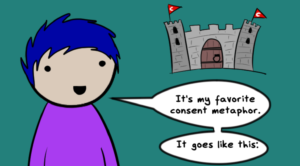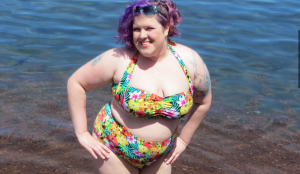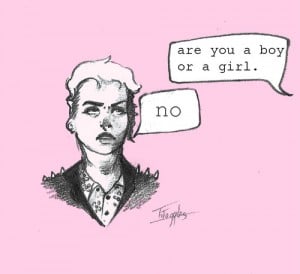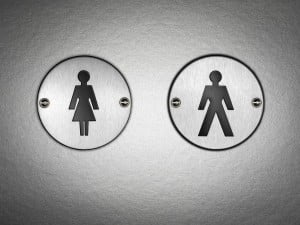
Person with a penetrating gaze staring directly at the camera
(Content Warning: Eating disorders, scales, dieting)
Originally published on The Establishment and republished here with permission.
You’re visiting the doctor today, and every time you visit a doctor for any reason, you’re never sure if it’s the type of medical issue that’ll require your providers to have background knowledge of your eating disorder (ED).
That statement is true, and, well, it isn’t.
You know by this point that the varied and wide-reaching symptoms, triggers, and consequences related to eating disorders mean that your ED is relevant and important medical knowledge no matter the circumstance.
Your ED specialists have made this clear to you over the years, and you understand them and trust what they know in this regard. You know that every doctor with whom you meet needs to know about your eating disorder and factor it into your treatment.
The doctors don’t always know that, though.
It’s been said, better, and by smarter and more well-researched people, that there is sometimes a problem in the medical field where medical professionals stare right through the patient without seeing them, treating symptoms or statistics rather than a living person.
And this issue, of intelligent and highly experienced doctors overlooking or disregarding many of the “human” aspects of their human patients, becomes very relevant if you happen to have an eating disorder.
Others might assume that a visit to, say, a urologist, has nothing to do with an eating disorder. But, by now, you know that everything about your life can and probably will eventually have something to do with your eating disorder.
But you’ve been taught tricks, and at least a few have stuck in your head so that you have something resembling a loose game plan, some back pocket plays you hang onto for protection.
The receptionist hands you a clipboard holding several papers, and you sit down. You look at the multi-page form where you’re meant to check the boxes that let these new doctors and nurses know about the current and past state of your body.
These forms are by and large the same, but there are always differences from office to office: One wants to know if your parents have had cancer, and one just needs to know if you have. Many of them include disorders such as ADHD, depression, and anxiety. They don’t always include eating disorders.
This one today does, and you check the box. It doesn’t ask you to specify what type, so you don’t. But you wish you were able to tell them how different the types are.
You often feel guilty using the term “eating disorder” about yourself because you know that people automatically assume it means anorexia nervosa and will treat you a certain way because of that.
But you’re recovering from bulimia. You wish your medical professionals knew how little you felt you had in common with many anorexia sufferers.
Mostly though, you wish these thoughts weren’t relevant to your life or this form, and you try to simply check the box and move on. Checking the box at least means they know, and it’s important that you know they know. You watch the receptionist enter the information into your file.
Your name is called by the nurse, and she leads you to the first room, which contains a scale, and you know what will happen now. This is where your game plan comes in.
You think of yourself as recovered, and by all diagnostic criteria you are. You tell yourself you don’t even think about your eating disorder anymore. But, in fact, multiple times a day, often in the space of the same minute, you talk yourself in and out of purging.
You still can’t eat some of the safe foods that were the staples of your diet at your sickest. But you don’t binge or purge, and you haven’t stood on a scale in eight months.
Though you still struggle, you know that whatever progress you’ve made (and it’s substantial!) has been, in no small part, the result of ditching your scale and weaning yourself off of a total reliance on using numbers to define your identity.
You made some progress before you stopped weighing yourself, but your true commitment to recovery happened with that choice.
And so, though you feel performative, and self-indulgent, and three years old, and fragile every time you get to this part of a doctor’s visit, you know what you need to do, and you do it. You ask to stand backwards on the scale.
You know you’re not medically required to see your own weight, and, for that matter, you know that doctors’ offices are not even required to take your weight at all – but they always do. You know some people who have been brave enough to ask not to be weighed at all and push back when the nurse insists.
You’re not that person, and you want this to go smoothly, and you’d really prefer that you were just normal anyway, and so you ask to stand backwards on the scale, and she lets you.
You ask to stand backwards on the scale, but you still make sure you take off your shoes, even though they are cumbersome, and all your extra layers, because it’s winter, and you have both a coat and a sweater, so that you can make yourself lighter out of habit.
When you step on the scale, you realize your cell phone is still in your pocket, and you panic, trying to figure out how much it weighs.
You can’t see the number on the scale and still you’re afraid of the number you aren’t seeing. The seconds standing on the scale feel endless, but when you finally do get to step off, you’re relieved to know that you don’t have to confront the “consequences.”
Being weighed was a momentary and forgettable misery as long as you don’t have to know what you weighed.
Except now you know someone else knows, and that someone else is seated at the computer entering that data into your file, the same file that contains the detail that you have an eating disorder.
You know the area of the computer screen where your file will list your weight, and you try to avoid it or hope the nurse will tell you to look away but she doesn’t and you just can’t help yourself so you glance at it. It’s the highest number that has ever been in any of your medical files.
Your nurse has been aware of none of this. She’s already moved on to measuring blood pressure. To her, you’re completely fine. Perhaps, she thinks your eating disorder was a girlhood phase. More likely, she hasn’t thought about it at all. Yes, it’s in your file, but she has a job to do.
Meanwhile, in your head and wherever you feel all the feelings you wish you didn’t feel, you’re imploding.
All throughout the rest of this genuinely important visit to a very talented medical specialist, to address an issue that ostensibly has nothing to do with your eating disorder, the number you saw is rapidly taking root inside your mind and becoming a part of you.
Your brain is playing many sick games all at once, putting pieces together, parsing out the significance of that number, remembering every other number that has come before it, thinking of all the things in movies and TV shows and in print that you have seen other people say about that number, all the times you’ve seen it plastered next to a “before” picture during a weight loss commercial.
But you’re also trying to fight back, trying to tamp down all the panic and the hate, trying to be the person who’s made progress.
While your doctor examines your file and begins talking about the health condition you came in to address, you’re trying to forget the number.
You focus and refocus on the present, maintaining a steady and engaged demeanor as you make note of what your doctor is saying and make plans together for the future of your treatment. You ask questions.
You hope you can force the number to become a blurry memory, to lose shape around the edges and eventually fade to static like so many of the calorie counts you never thought you could ever forget but did.
The doctor today suggests, as part of your treatment plan, examining the foods you eat and changing your diet. She has a list of foods. You’ve seen so many lists of foods, and you want to think you can handle them like normal people, but you’re not sure.
You think about explaining this to her, but feel guilty that you’re not normal. She seems to want you to be.
By the end of the appointment you almost believe you can compartmentalize that moment of glancing at the computer so successfully that you can make the number meaningless, and move forward with the treatment plan.
But when the doctor hands you the forms she printed out for you to take home, the number is sitting right at the top in bold and you know that you’ve got a longer way to go on your recovery journey than you did when you walked in this morning.
Before the day is out, you will have cried in a diner and made plans to join a support group.
As you leave the doctor’s office, you wonder if any of those nurses and doctors has ever had to sit in an examining room much like the ones they work in every day and make bargains like, “you’re only allowed to weigh yourself once a week.”
If they have, you wonder if any of them have ever been the patient, not the professional. You remember times when you felt like a professional patient.
You hated those times for how you lost yourself, how your life got made so small and yet so high stakes, to the point that you had to bargain with doctors about your weight-measuring habits.
You wonder, but you’ll never know, although you’ve learned through years of research, both your own experiences and the data-driven studies of others, that most of the people in the medical industry who don’t specialize in EDs have little to no understanding of the far-reaching impacts of the illness, and they’re not always prepared to factor it into their relationship with a patient.
In a 2015 study of 637 medical programs across five general disciplines – family medicine, internal medicine, general psychiatry, pediatrics, and child and adolescent psychiatry – 14.5% of the programs offered no formal eating disorder teaching at all.
For those that did, internal medicine programs offered an average of 1.94 hours of training, family medicine an average of 3.55 hours, and pediatrics an average of 5.25 hours.
General and child and adolescent psychiatry, distressingly, offered only four hours of eating disorder teaching over the course of a four-year program.
Medical professionals have displayed a stigma toward eating disorders that has been studied as well.
A 2012 literature review of twenty different studies determined that “clinicians across professional disciplines react negatively to patients with eating disorders” and that “negative reactions to patients with eating disorders were associated with patients’ lack of improvement and personality pathology and with clinicians’ stigmatizing beliefs, inexperience, and gender.”
You know the medical community as a whole has a long way to go in recognizing and properly addressing the needs of patients with eating disorders.
The study of eating disorders only received $31 million in funding in 2015, compared to $589 million for Alzheimer’s disease and $241 million for schizophrenia. And you understand, you do, that not all doctors can be everything to everyone.
But you also know that 30 million Americans experience eating disorders in their lives and that they have some of the highest mortality rates of any psychiatric disorder.
You also know that doctors’ offices always weigh you even when they don’t need to, and you wonder how, among all that is required of you to recover, you’re meant to better advocate for yourself during a visit to a doctor who’s supposed to be dedicated to your health.
[do_widget id=’text-101′]
Kayleigh Hughes is a freelance culture writer and personal essayist based in Austin, Texas. She writes about film at Bustle, and her writing on music, film, and mental health has appeared at Pitchfork, Vox, Paste, Watt, Consequence of Sound, Catapult, The Establishment, and local Austin music site Ovrld. She is a proud alumni of publication-slash-writer-support-collective Loser City. You can find her portfolio here, buy her a coffee here, and tweet her at @kayleighqueue.
Search our 3000+ articles!
Read our articles about:
Our online racial justice training
Used by hundreds of universities, non-profits, and businesses.
Click to learn more




















